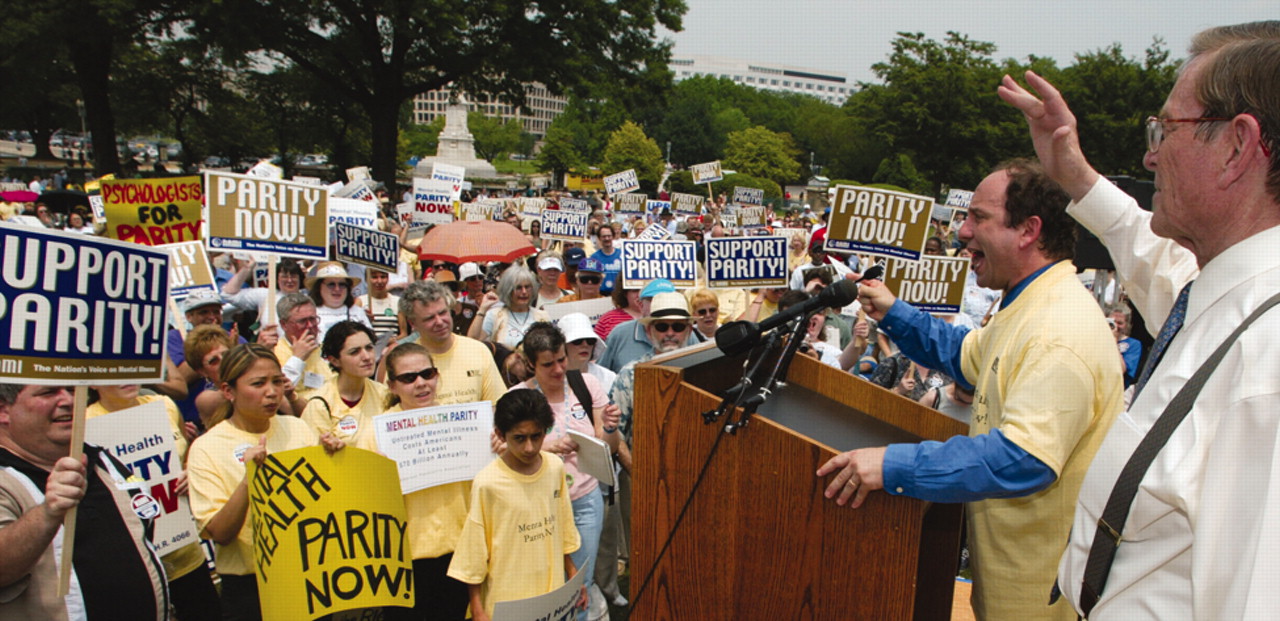In 1990 the people of Minnesota, impressed by his unorthodox political campaign and liberal ideas, chose Paul Wellstone, a college professor untested in the political arena, to represent them in the U.S. Senate. Soon after his arrival on Capitol Hill, Wellstone emerged as a forceful champion of all people touched by mental illness—and continued to justify that reputation during the next 12 years.
Wellstone’s Minnesota constituents, as well as the mentally ill people for whose rights he fought and the professionals who treat their disorders, lost a tireless, vigorous, and unbending advocate when he died in the crash of a small plane during a mild snow and ice storm in northern Minnesota on October 25. The crash, during Wellstone’s campaign for re-election, also took the lives of Wellstone’s wife, daughter, and three campaign aides.
Wellstone, whose controversial votes on several issues won him the label of maverick and cost him support even in his generally liberal home state, was locked in one of the tightest races of the 2002 campaign.
He is best known in the mental health community for his cosponsorship of landmark legislation that gave limited parity to coverage of mental disorders for the first time on the federal level. That law, signed in September 1996 by President Bill Clinton, mandated parity between mental and physical disorders in the lifetime and annual dollar limits insurers can impose on treatment costs.
With that bill scheduled to sunset last year, Wellstone and Sen. Pete Domenici (R-N.M.), who had also cosponsored the 1996 law, set out to expand parity through new legislation, known as the Mental Health Equitable Treatment Act. This legislation would guarantee the same level of insurance coverage for care of psychiatric disorders as that provided for physical disorders. With sentiment growing that parity legislation was needed in this country, President George W. Bush gave his backing to the bill (Psychiatric News, May 17).
Despite Bush’s endorsement, the prospects for its passage during this session of Congress are not good. The Senate did pass an identical bill last year, but it was killed by House Republican leaders during a conference committee to resolve differences between it and the House-passed parity bill.
Wellstone has also been a sponsor of legislation to help schools respond to domestic violence issues and to end the discriminatory copayments and lifetime limits that the Medicare system imposes on reimbursement for mental illness treatment. He also championed legislation to benefit consumers, family farmers, union workers, and the environment.
Jay Cutler and Nicholas Meyers, director and deputy director, respectively, of APA’s Division of Government Relations, knew the late senator well. “He cared deeply for persons with mental illness, a focus borne out of the personal struggles of his own brother,” they said in a statement to Psychiatric News. They recalled Wellstone’s appearance at a rally for parity on Capitol Hill in the midst of a sweltering Washington summer.
“It was easily over 100 degrees, but as he waited patiently for his turn to speak, he grabbed a bright yellow ‘Mental Health Parity Now’ T-shirt from someone in the crowd, pulled it over his own shirt and tie, and stepped to the podium—his hand chopping the air for emphasis—to exhort the crowd to do better, to keep fighting for parity. Every other speaker was struggling to look good, but there was Paul Wellstone in a funky yellow T-shirt, deep in his element, and supremely happy.”
Tributes Pour In
Immediately following the news of Wellstone’s death, most major voices in the mental health advocacy and professional community issued statements praising Wellstone’s unwavering commitment to improving the lot of people with mental illness.
APA President Paul Appelbaum, M.D., and Medical Director Steven Mirin, M.D., hailed Wellstone as “a true mental health champion,” adding that he was “a tireless and fearless spokesperson and fighter for all persons suffering from physical or mental disabilities. Sen. Wellstone was unafraid to stand up for causes in which he believed, regardless of their political popularity.”
National Mental Health Association President and CEO Michael Faenza said in a statement, “No one stood up more consistently or courageously for the ideals our 100-year-old movement holds at its center. As a nation and a movement, we have lost someone whose contribution would be hard to measure. . . .”
Jim McNulty, president of the National Alliance for the Mentally Ill, said, “Our members have loved and admired Sen. Wellstone for his tireless advocacy on behalf of people with mental illnesses. Whether fighting for passage of mental health insurance parity legislation or conducting an unannounced visit to a juvenile justice facility, he brought a rare passion and energy to fighting discrimination against people with mental illnesses as part of a broader commitment to individual dignity, freedom, and bonds of justice that bring our nation together as a community.”
The American Association for Geriatric Psychiatry’s president, Gary Kennedy, M.D., said Wellstone’s “leadership, passion, and commitment will surely be missed, not only in the Senate, but across the country.”
Always a Fighter
Wellstone, the son of a Russian Jewish immigrant, was a fighter all his adult life. He was a college wrestling champion and held the Capitol Police gym’s record (91) for pushups in one minute. He won his first election in 1990 by campaigning across Minnesota’s vast expanses in an old, green school bus. He narrowly beat incumbent Republican Rudy Boschwitz, whom he defeated again in a 1996 rematch. He set the tone for his Senate career in his first year on Capitol Hill, when he was the only senator to vote against the Persian Gulf War.
Last month he voted against the latest endorsement of war with Iraq, the only senator running for re-election to do so.
Earlier this year Wellstone acknowledged that he had a mild form of multiple sclerosis. A Washington Post editorial published the day after Wellstone’s death quoted him as saying, “ I have a strong body, I have a strong heart, I have a strong soul.”
“Many in Washington,” the editorial pointed out, “would have viewed that self-evaluation as, if anything, an understatement.” ▪


